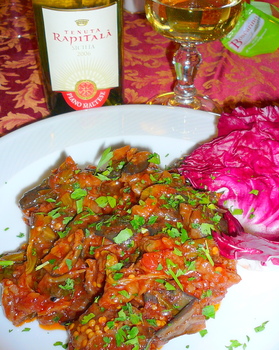 If you ask the florist to send your beloved a dozen roses, you'd be ticked if a bouquet of tulips were delivered instead, right? A rose is not a tulip. The fact that they're both flowers doesn't make them the same, equal or identical. Language exists to give names to things; there's no room for "poetic license" in the garden, or, for that matter, in the kitchen.
If you ask the florist to send your beloved a dozen roses, you'd be ticked if a bouquet of tulips were delivered instead, right? A rose is not a tulip. The fact that they're both flowers doesn't make them the same, equal or identical. Language exists to give names to things; there's no room for "poetic license" in the garden, or, for that matter, in the kitchen.
Here's an illustration. Two Seattle chefs, both with inquiring minds, fine palates and deft hands, have on their menus a dish called Caponata. Not so.
I wrote a post a couple of months ago picking on Il Corvo, a lovely, lunch-only restaurant in Pioneer Square with ethereal, handmade pasta. I admire the restaurant tremendously. Chef Mike Easton happens to offer an appetizer that he calls caponata. But it's not caponata. Why? Because it contains no eggplant. Without eggplant, it's more of a giardiniera, perfectly delicious, with sweet & sour pickled cauliflower and other seasonal vegetables.
Today, in a review of Maria Hines's new Agrodolce, Provi Cicero mentions the "the sweet-sour tension in caponata made with Brussels sprouts instead of eggplant."
Noooo! Look, I'm all for culinary innovation, if that's what the chef wants to serve. I'm all for cauliflower and Brussels sprouts, pickled, sautéed, boiled, mashed. Go ahead, be my guest. But there's a reason that things have names.
It's not a mere regional difference in nomenclature (we say "trunk," the Brits say "boot"). It's not a metaphor or a simiile ("Happiness is a warm puppy," "My love is like a red, red rose").
The expression that you can't make an omelet without breaking eggs? Well, you could make something that looks like kinda looks like an omelet without any eggs at all. You could serve just about any white wine and pretend it's chardonnay.
Nor is the distinction symbolic. You can find half a dozen recipes for "scrapple" online, for example, but they all use pork; that's what makes it scrapple. You can find plenty of recipes for caponata in a bookshelf of Italian recipe books, but they all start with eggplant. That's what makes it caponata. The authentic caponata in the picture: at a restaurant called Vecchietti in Palermo, Sicily.
Authenticity: it's more than traditional; it's historic and absolute. The chef, the cook, doesn't get to decide.
Agree? Disagree? Hit the Comments link!
Totally agree!!